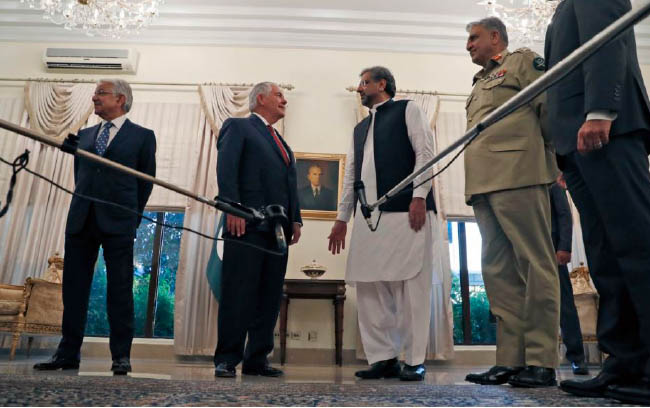ISLAMABAD - Pakistan has cautioned the United States that "cooperation," not "coercion," is the way forward for the two countries to find a politically negotiated end to an increasingly deadly war in Afghanistan.
The message was conveyed to U.S. Secretary of State Rex Tillerson when he undertook his inaugural visit to Islamabad last Tuesday for detailed talks, led by Prime Minister Shahid Khaqan Abbasi, with civilian and military leaders, say Pakistani officials.
The discussions focused on regional counterterrorism efforts and promoting peace talks between the Afghan government and the Taliban.
During his four-hour stay in Pakistan, Tillerson also went into a “one-on-one” meeting with General Qamar Javed Bajwa, the chief of the military institution accused of covertly maintaining ties and sheltering Taliban leaders. Tillerson also called for Pakistan to take action against terrorists on its soil. “If Pakistan fails to act against terrorists, the U.S. will get it done in a different way," he said.
Army spokesman Major General Asif Ghafoor, while speaking to VOA Monday, described Bajwa’s discussions with Tillerson as "candid, frank and without mincing words."
Peace process
The army chief reiterated that “cooperation will take us forward; confrontation or coercion will not,” Ghafoor said. Pakistan re-emphasized that it supports an Afghan-led and Afghan-owned peace process and believes “reconciliation” is the way forward to end the war.
“We have done our part [on our side of the border] and shall continue to contribute toward enduring peace and stability in the region, keeping Pakistan’s interest supreme,” said the army spokesman. Pakistan denies allegations of havens on its soil, saying its security forces have cleared the country of militants.
Other stakeholders, said Ghafoor, also need to adopt a “methodology” which encourages progress for peace and reconciliation in Afghanistan. He did not elaborate.
Officials in Pakistan say U.S. President Donald Trump’s administration is also relying on its military might, like its predecessor did, to pressure the Taliban to come to the negotiating table, despite knowing the policy has not worked during the past 16 years.
Trump, in his recently unveiled Afghan strategy, authorized deployment of several thousand U.S. troops and more use of American military power in support of Afghan forces' operations against the Taliban.
"They [the United States] do want to go for reconciliation but they need to review their current strategy for achieving results,” said a Pakistani government official while speaking to VOA on condition of anonymity because he is not authorized to speak to the media.
The official added that the Afghan government also needs to do "a lot" in terms of creating conditions to encourage the Taliban to engage in a peace process.
Pakistani officials maintain Kabul and Washington need to offer the Taliban a peace dialogue first and that the Qatar-based political office of the insurgents could be utilized for that purpose. It may help, they say, to separate those Taliban leaders who are in favor of talks from those who oppose reconciliation and, eventually, it will justify military operations against “irreconcilables.”
Officials acknowledge that Islamabad and Washington continue to hold widely divergent views on how to kickstart an Afghan peace process and last week’s discussions did not bring the two sides closer on the issue.
Growing regional influence
Pakistan also points to the Taliban's growing contacts with countries like Russia, China and Iran, saying these countries are now better placed than Islamabad to influence the insurgents to engage in peace talks with the Afghan government.
Islamabad's influence over the Taliban is "often overestimated" in Washington," according to a Pakistani Foreign Ministry official who also spoke to VOA on condition of anonymity.
In his post-Pakistan visit comments, Tillerson said the United States is in contact with the Taliban through “back channels” and the Doha office, saying there is a role for the insurgent group in the Afghan government.
“Please come. Please come and take up your role, but you must come on the condition that you renounce terrorism, you renounce violent extremism, and you will never take up those efforts again,” Tillerson said while speaking to reporters Friday in Geneva.
He went on to say the Afghan government has a special responsibility to create the conditions to invite the Taliban to the negotiating table.
The Taliban has long maintained it will not engage in any peace talks until all American and NATO forces leave Afghanistan and allow Afghans to determine a political reconciliation process.
The insurgency has extended its control to more than 40 percent of Afghanistan since international combat troops left the country in 2014 and it continues to make battlefield gains. (VoA)
Home » Afghanistan » Pakistan, US Divided on How to Initiate Afghan Peace Talks
Pakistan, US Divided on How to Initiate Afghan Peace Talks

